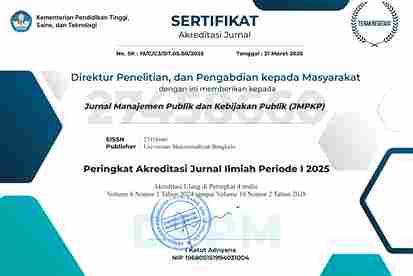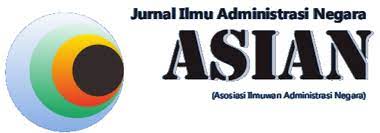Implementation of Waste Reduction Policy Based on Regional Regulation Number 13 of 2019 concerning Amendments to Regional Regulation Number 3 of 2013 concerning Waste Management in South Tangerang City
DOI:
https://doi.org/10.36085/jmpkp.v7i2.8275Keywords:
Pengelolaan Sampah, Implementasi Kebijakan, Pengurangan Sampah , Tangerang Selatan , Kerangka GrindleAbstract
This study analyzes the implementation of Tangerang Selatan’s waste reduction policy, as outlined in Regional Regulation No. 13/2019, using Merilee S. Grindle’s policy implementation framework. Methodology applied on this research is qualitative methodology using interview, surveys, and observation. The findings indicate that while several programs, such as Zero-Waste Homes, TPS 3R, and Intermediate Treatment Facilities (ITF), have been successfully implemented, the overall policy effectiveness remains suboptimal. Key challenges include limited human resources, ineffective public communication, and the absence of a structured incentive- and penalty-based compliance system. The persistence of illegal waste dumping and low participation in waste sorting at the household level further hinder progress. Despite these obstacles, various supporting factors contribute to the policy’s implementation, including public awareness campaigns, private sector collaboration, and the integration of waste management technology. To enhance policy effectiveness, this study proposes several recommendations: strengthening collaboration with the private sector through CSR programs, implementing Extended Producer Responsibility (EPR) for upstream waste reduction, improving human resource capacity through training, utilizing social marketing for better public communication, integrating technology in waste processing, and establishing a structured compliance monitoring system. These measures are essential to achieving Tangerang Selatan’s waste reduction targets and ensuring long-term sustainability in waste management.
References
Ali, S., Ahmed, W., Solangi, Y. A., Chaudhry, I. S., & Zarei, N. (2022). Strategic analysis of single-use plastic ban policy for environmental sustainability: the case of Pakistan. Clean Technologies and Environmental Policy, 24(3), 843–849. https://doi.org/10.1007/s10098-020-02011-w
Ananta, A. N., & Wibawani, S. (2024). Strategi PT. Pratama Jatim Lestari dalam mengelola pusat pengelolaan sampah dan limbah B3 sebagai upaya menuju Jawa Timur Net Zero Waste. Jurnal Manajemen Publik dan Kebijakan Publik (JMPKP), 6(2). https://doi.org/10.36085/jmpkp.v6i2.6124
Babbie, E. R. (2020). The Practice of Social Research. Cengage.
Bharadwaj, B., Baland, J. M., & Nepal, M. (2020). What makes a ban on plastic bags effective? the case of Nepal. Environment and Development Economics, 25(2), 95–114. https://doi.org/10.1017/S1355770X19000329
Creswell, J. W. (2003). Research Design: Qualitative, Quantitative, and Mixed Methods Approaches. Sage Publications.
Dinas Lingkungan Hidup Kota Tangerang Selatan. (2023). Rencana Induk Pengelolaan Sampah Kota Tangerang Selatan 2023.
Doeleman, H. J., van Dun, D. H., & Wilderom, C. P. M. (2022). Leading open strategizing practices for effective strategy implementation. Journal of Strategy and Management, 15(1), 54–75. https://doi.org/10.1108/JSMA-09-2020-0253
Fahmi, S. (2011). ASAS TANGGUNG JAWAB NEGARA SEBAGAI DASAR PELAKSANAAN PERLINDUNGAN DAN PENGELOLAAN LINGKUNGAN HIDUP. JURNAL HUKUM IUS QUIA IUSTUM, 18(2), 212–228. https://doi.org/10.20885/iustum.vol18.iss2.art4
Fredriksson, M., Tiainen, A., & Hanning, M. (2015). Regional media coverage influences the public’s negative attitudes to policy implementation success in Sweden. Health Expectations, 18(6), 2731–2741. https://doi.org/10.1111/hex.12247
Grindle, M. S. (1980). Politics and Policy Implementation in the Third World. Princeton University Press.
Gruber, M. (2022). The Integration of Local Actors in Policy Implementation: The Case of Organic Farming in Costa Rica. Sustainability, 14(12), 7265. https://doi.org/10.3390/su14127265
Hastuti, B. D., Anwar, F., Darmi, T., Studi, P., & Publik, A. (2021). IMPLEMENTASI KEBIJAKAN PENGELOLAAN SAMPAH DI KABUPATEN BENGKULU SELATAN. http://jiapi.ut.ac.id/index.php/jiapi/index
Hill, M., & Hupe, P. (2002). Implementing Public Policy: Governance in Theory and in Practice. SAGE Publication.
Husain, I. A., & Hertati, D. (2023). POLICY IMPLEMENTATION FOR REDUCING THE USE OF PLASTIC BAGS. In Jurnal Kebijakan Publik (Vol. 13, Issue 2). https://jkp.ejournal.unri.ac.idhttps://jkp.ejournal.unri.ac.id
Iqbal, M., Mulyadin, R. M., Ariawan, K., & Subarudi, S. (2022). Analisis Implementasi Kebijakan Pengelolaan Sampah Di Provinsi Dki Jakarta. Jurnal Analisis Kebijakan Kehutanan, 19(2), 129–140. https://doi.org/10.20886/jakk.2022.19.2.129-140
kabar6.com. (2021). TPS 3R, Kunci Kurangi Beban Sampah di Kota Tangsel. https://kabar6.com/tps-3r-kunci-kurangi-beban-sampah-di-kota-tangsel/
Kemenko Maritim. (2017). Indonesia’s Plan of Action on Marine Plastic Debris.
Khaerani, T. R., Anggraeny, R., Gilang, M., & Ramadhan, A. (2021). INOVASI KEBIJAKAN PENGURANGAN SAMPAH PLASTIK DI KOTA BALIKPAPAN. Jurnal MODERAT, 7(3).
Kompas. (2020). Turap TPA Cipeucang Jebol, Dinas LH Tangsel: Tumpukan Sampah Overload. https://megapolitan.kompas.com/read/2020/05/23/13120211/turap-tpa-cipeucang-jebol-dinas-lh-tangsel-tumpukan-sampah-overload
Liu, C., & Liu, C. (2023). Exploring Plastic-Management Policy in China: Status, Challenges and Policy Insights. Sustainability (Switzerland), 15(11). https://doi.org/10.3390/su15119087
Macintosh, A., Simpson, A., Neeman, T., & Dickson, K. (2020). Plastic bag bans: Lessons from the Australian Capital Territory. Resources, Conservation and Recycling, 154. https://doi.org/10.1016/j.resconrec.2019.104638
Maria Da Silva, L., Nursalam, N., & Toda, H. (2020). Policy implementation of local governments in waste management in Dili City, Timor Leste. Journal of Governance and Accountability Studies, 1(1), 1–13. https://doi.org/10.35912/jgas.v1i1.343
Miles, M. B., & Huberman, M. A. (1994). Qualitative Data Analysis: An Expanded Sourcebook. Sage Publications.
Paul, W. M. K., & Mironga, J. M. (2020). Effectiveness of the Implementation of Plastic Bags Ban: Empirical Evidence from Kenya. IOSR Journal of Environmental Science, 14(6), 53–61. https://doi.org/10.9790/2402-1406025361
Republika. (2024). Pemkot Tangerang Selatan Kerahkan Berbagai Upaya Strategis untuk Atasi Sampah. https://news.republika.co.id/berita/scddfw451/pemkot-tangerang-selatan-kerahkan-berbagai-upaya-strategis-untuk-atasi-sampah
Sea Circular. (2021). Sea Circular Country Profile: Indonesia.
Sonia, E., & Ritonga, S. H. N. (2024). Kinerja Dinas Lingkungan Hidup dalam mengelola sampah di Kecamatan Rantau Utara Kabupaten Labuhanbatu. Jurnal Manajemen Publik dan Kebijakan Publik (JMPKP), 6(2). https://doi.org/10.36085/jmpkp.v6i2.6252
Trinh, L. T. K., Hu, A. H., & Pham Phu, S. T. (2021). Situation, Challenges, and Solutions of Policy Implementation on Municipal Waste Management in Vietnam toward Sustainability. Sustainability, 13(6), 3517. https://doi.org/10.3390/su13063517
viva.co.id. (2024). Pemkot Tangsel Tiap Hari Berjibaku Atasi 1000 Ton Sampah, Benyamin: Persoalan yang Serius. https://www.viva.co.id/berita/nasional/1707610-pemkot-tangsel-tiap-hari-berjibaku-atasi-1000-ton-sampah-benyamin-persoalan-yang-serius?page=1
wartatangerang.com. (2024). Solusi Berkelanjutan Pengelolaan Sampah Terpadu di Tangerang Selatan dengan TPS 3R. https://wartatangerang.com/solusi-berkelanjutan-pengelolaan-sampah-terpadu-di-tangerang-selatan-dengan-tps-3r/
Yudianto, T., Setyono, P., & Handayani, I. G. A. K. R. (2021). Implementasi Kebijakan dan Strategi dalam Pengelolaan Sampah di Kabupaten Blora. Jurnal Kesehatan Lingkungan Indonesia, 20(1), 21–26. https://doi.org/10.14710/jkli.20.1.21-26
Zaman, A. (2023). Zero-Waste: A New Sustainability Paradigm for Addressing the Global Waste Problem. In The Vision Zero Handbook (pp. 1195–1218). Springer International Publishing. https://doi.org/10.1007/978-3-030-76505-7_46









